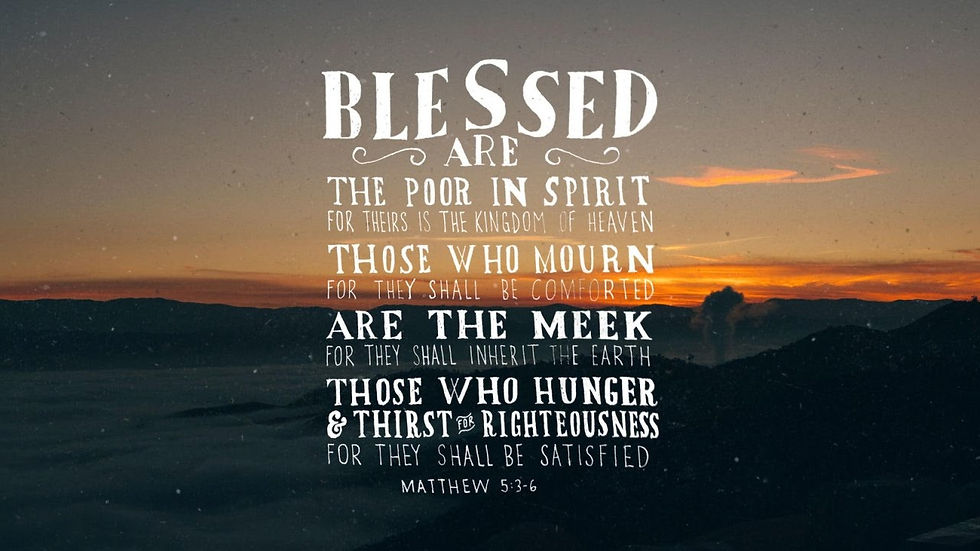Sowing the Seeds
- Christ Episcopal Church

- Jan 26, 2024
- 4 min read

Today, I attended the inaugural meeting of the Howard County Interfaith Council, on which I was invited to serve. County Executive Calvin Ball delivered a short speech before he signed the Executive Order and handed the group of 17 clergy members over to his executive liaison. Nice as the kickoff was, I found myself momentarily distracted by the whiteboards near the podium that stated our purpose and objectives. The heading atop the center board read, in big, bold letters, “Inerfaith Council.”
Now, as someone whose other vocation is in strategic communications and writing, I couldn’t help but notice the error—and chuckle to myself. Not at the mistake, but at the unintended misspelling’s double entendre. Indeed, the group of Christian, Jewish, Hindu, and Muslim clerics present had gathered not for the ceremony or the photo opportunity, but because of their strong “Inerfaith”—or rather, Inner Faith.
I spent a little time mulling over the connection between the two terms: Interfaith and Inner Faith. And I concluded they are inextricably linked in ways we often fail to consider—across thousands of years and around the world, from the roots of Islam to the history of Judaism to the evolution of Christianity.
We see it in the overlaps in certain feast days and traditions, as well as oral histories that shaped the Bible, the Torah, and the Qur'an. For example, in Islam, our beloved Mary is called Miriam, one of the most revered women in their faith's history. Miriam, too, bears a son named Jesus, whom Muslims consider a great prophet. And of course, Jesus’ dual identity as Rabbi and as Christ the Messiah connects Jews and Christians across the ages.
At Christ Church, I’ve watched the seeds of interfaith connection blossom in extraordinary ways over the past two and a half years. From an initial conversation around potentially sponsoring a refugee family from Afghanistan to a thriving multi-congregational ministry, it is tremendous inner faith that drives these rich and diverse interactions.
Many Christ Church parishioners know well the story of our refugee family: an Afghan woman who worked in support of the U.S. government and three of her four sons, who fled to America to escape the Taliban. Nearly two and a half years after we assumed care for this family, the husband and fourth son who were tragically left behind recently had their applications for humanitarian parole approved. With the State Department denying 90% of these applications, I consider this nothing short of a miracle.
Now the family is one step closer to being together again after a long, painful separation—and several years of living in fear. Though it could be weeks or months longer, once they complete the visa application process and screenings at the U.S. embassy in Pakistan, they can board a plane to the U.S. for a reunion we will all celebrate with great joy.
The commitment we made together as a parish a few years ago, to help this family transition to independence in their lives here, is coming full circle. By the end of 2024, they will assume full responsibility for all their financial obligations. But our ministry doesn’t stop there, and in fact, has already expanded through connections across faith communities, cultures, beliefs and traditions. I believe the Spirit is working through these associations to transform us in ways hard to fathom—and harder still to explain.
For instance, some of our members have been assisting three members of a second refugee family who arrived in the U.S. last May. The father, a high-ranking official in the Afghan government, had worked closely with NATO and the U.S. military for six years until the U.S. withdrew from Afghanistan. He now lives in Howard County along with two of his seven children, while his wife and other children remain in Japan and try to get authorization to come to the U.S.
With no work authorization and limited aid, the father and two teenage children here in the U.S. are barely scraping by. A few generous Howard County citizens have paid the bulk of the rent for their small apartment in Elkridge. Christ Church parishioners, along with other friends, have also helped pay for rent, utilities, and food, as well as donated clothes and other essentials. Members of our Refugee Ministry also helped enroll the son in Oakland Mills High School and make connections at HCC.
And it doesn’t stop there. The breath of the Spirit continues to carry these seeds farther still. Recently a member of Wesley Freedom United Methodist Church in Eldersburg reached out to our Refugee Ministry for help and advice for their new sponsorship of a four-member Afghan family in the U.S. since late 2021. The young father, mother, and two toddler boys just moved to Elkridge, having lived in multiple less-than-ideal locations over the past few years.
Just this week, some Christ Church members met the family. Our parishioners immediately jumped in to assist with getting an assessment of the three-year-old by HCPSS early childhood specialists to see what services might benefit him. They also connected them with the son from our sponsored refugee family who works for Lutheran Social Services, to possibly provide helpful resources, offer translation assistance, and expand their Afghan connections.
Think about it: From a small group of Christ Church discerners to abounding blessings across three families and five faith communities—and beyond. Oh, how the Spirit works when we are willing to open our vulnerable inner selves to serve the outward needs of this broken world.
As we continue to be mutually blessed by these connections, we can trust God will continue to multiply them to build up the Kingdom, guiding us to a healed, whole, and reconciled world where all God’s children walk together in love. Because whether the heart of our inner faith cries out to Jesus or Yahweh or Allah, God is good!
-Denise+





